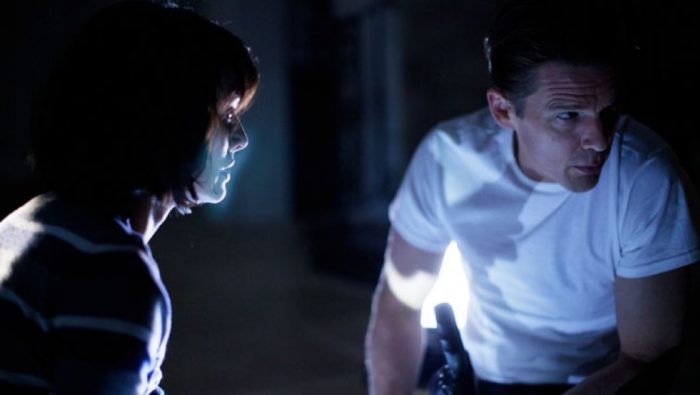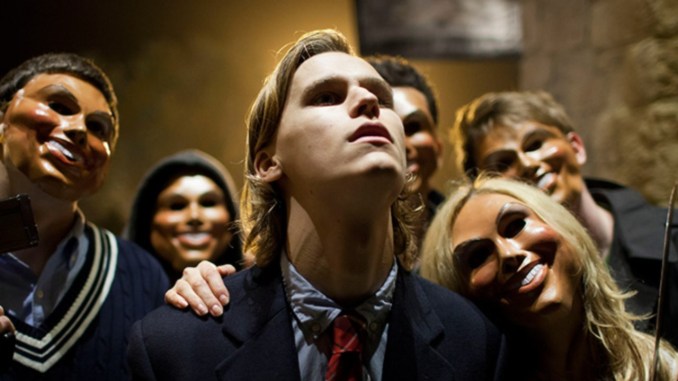
Considering we already talked about Insidious on The Pick last week, and I’ll be reviewing The Conjuring in a couple of days, it’s shaping up to be a very Blumhouse Shocktober for me. The Purge is a pretty typical Blumhouse production, in that it has a very small budget ($3 million to be exact), a few notable stars, and somehow managed to make enough money to become a franchise that now consists of four movies and TV series. This, of course, all has to do with my decision to review it, since I wanted to see if all the hubbub over it was earned, or whether it just became popular based off of its morbidly intriguing premise.
That premise being that it’s 2022, and a new totalitarian government has made it so that in America, one day every year, for 12 hours, people can kill whoever they want legally. The movie doesn’t go into a ton of detail on how all of this works, but the idea is that everyone who has a bunch of rage and aggression built up gets to let it all out by killing someone. Also, it’s implied that a lot of these killings are done to poor people, who can’t defend themselves, which supposedly does society good by eliminating poverty and crime in the process. Obviously, this is a big, controversial idea to delve into, which the movie doesn’t really do very thoroughly or thoughtfully.
Instead the film focuses on the Sandin family, who live in a nice, secure suburb. Henry (played by Ethan Hawke) is the father, and he’s made a fortune off of all the security systems installed in the area that it’s wealthy homeowners use to protect themselves on each annual Purge Day. He has a daughter who’s secretly dating a boy Henry disapproves of, a son who’s into gadgets, and a wife (Lena Headey) whose personality traits are never really established. Well-prepared to hunker down for Purge Day, they have a bit of a problem when the son spots a homeless person being chased by murderous hooligans, who he then lets in to their house, to Henry’s chagrin.
Then from the home’s security cameras, we see that the Purgers have come to take the homeless man from them. The Sadins are willing to comply with the Purgers, as they capture the homeless man who’s hiding in their house, though only to realize that letting him die would be kinda crappy morally. So they decide to defend the house from the Purgers, who eventually break in and have a series of showdowns with the family, though it’s mostly mom and dad who do most of the killin’.
As you might have gathered from that synopsis, a big problem with The Purge is that it sets up this great topical, dystopian premise, but never really capitalizes on it. The movie more or less just turns into a “Trapped In The House” horror/action movie by the end, without really any consideration for the violence it’s depicting. Not that there’s anything wrong with making a “Trapped In The House” horror/action movie; you just have to question what the point is of introducing these heavier themes if you’re not going to explore them. In the end, the premise feels like a marketing strategy more than anything.
Though I suppose the movie does have some sort of moral compass by having these rich elitists eventually question how they’ve treated the working class. But it comes so late in the movie’s brief running time, that you never really sympathize with anyone, since they aren’t much more likable than the film’s smug villains. Then when you take into account that the film uses the poor, black guy being chased and murdered as nothing more than a prop (the character is billed as Bloody Stranger), it leaves kind of a bad taste in your mouth. Then again, it’s not like any of the other characters are that fleshed out, but at least they have names.
I do realize that a big reason that The Purge probably couldn’t explore its ambitious premise in a satisfying way is because it had such a modest budget. This would also explain why the film is set in such a near future (I assume more future tech demands a higher budget). So I wonder if the sequels, with their slightly higher budgets are able to deliver on this premise, since it seems like the sequels have gotten slightly better reviews than this first film. But whatever the case, at least The Purge got to contribute to Ethan Hawke having one of the more interesting (and odd) decades I can think of for a leading man. Onward, Ethan.


